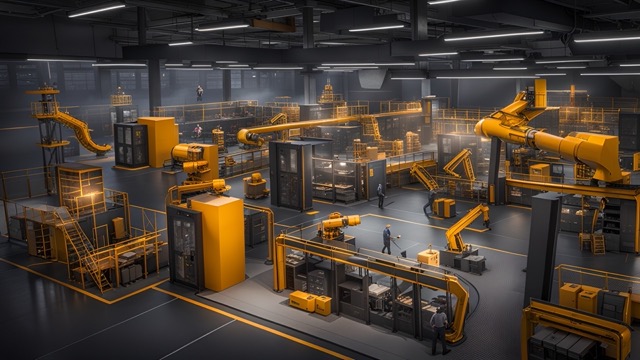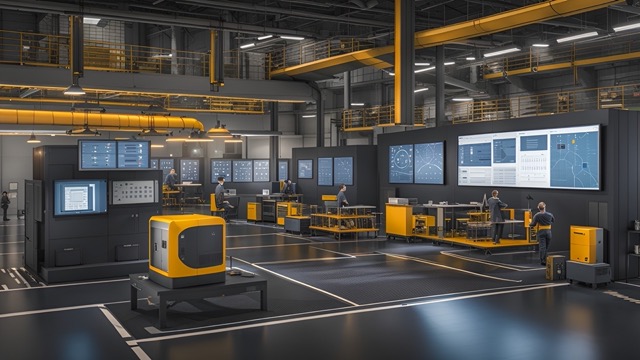Update: 20 September 2023
This paper is recognised as a Hot Paper and Highly Cited Paper by Essential Science Indicators (ESI), Web of Science. Highly Cited Papers rank within the top 1% of the academic field in the Science Citation Index Expanded, based on a highly cited threshold for the field and publication year.Hot Papers place in the top 0.1% of the academic field.
Note:
This is a summarised version of the Opinion Paper - Shaping the metaverse into reality: Multidisciplinary perspectives on opportunities, challenges, and future research: Industrial Metaverse and Operations Management that appeared in Taylor & Francis' Journal of Computer Information Systems
| Industrial Metaverse and Manufacturing Operations Management |
|---|
 |
Consider the possibility of collecting comprehensive physical, manufacturing, and operational data at every stage of a product's life cycle, seamlessly integrating these data streams to gain real-time insights into product design, maintenance, and optimization – all while on the move. This isn't merely a digital concept; it's a tangible prospect within the metaverse.
For example, the Korea Advanced Institute of Science and Technology's virtual plastic screw factory employs VR, AR, and MR, allowing visitors to monitor manufacturing, operate machines, and instantly adjust settings for real-time impact analysis. Lenovo's ThinkReality platform integrates AR workflows, enabling engineers to receive fault alerts, access technical knowledge with wearables, and optimize production processes through 3D modeling and digital experiences.
These examples underscore the transformative potential of the industrial metaverse in manufacturing operations management. It marks a significant departure from traditional approaches with long lead times and quality concerns. While full telepresence may not be here yet, tech giants like Alibaba, Microsoft, and Facebook are investing in the metaverse for various economic purposes.
National Industry Strategy 2030
Key takeaways from the National Industry Strategy 2030, which emphasizes technological innovation, quality, technology mastery, and industrial sovereignty. The metaverse holds significant potential for three main aspects of manufacturing: factory layout design, production setup, and product viewing and reception. These aspects will transform the manufacturing landscape.
| Manufacturing Operations Management |
|---|
 |
In the metaverse, immersive experiences offer lower barriers to design entry. Products can be created from virtual templates, with digital assets integrated from physical items. Layouts and prototypes can be developed and tested, expediting design and production. The metaverse complements existing digital transformation technologies, going beyond IoT and digital analytics. It allows for digital twins without physical asset connections, enabling extensive simulations and real-time data access to mitigate costly errors. Collaboration is enhanced, as demonstrated by BMW's use of Nvidia's Omniverse, reducing production planning times by 31%.
Companies must assess their metaverse assets, understand value propositions, and adapt to defend their positions and monetize assets. The metaverse enables co-creation, streamlining logistics and warehousing functions, providing immersive training, and offering personalized avatars for virtual factory exploration. While the metaverse is in its early stages, it challenges conventional wisdom by emphasizing information sharing, leading to improved resource utilization and lower costs. A metaverse legal framework and governance will be essential to manage technology applications effectively.
Research Agendas
Existing systems are often disconnected, requiring organizational alignment in culture, rules, goals, and processes through compatible technologies. The challenge is to support enterprises and systems that need persistence, validity, and auditability.
| Future Research |
|---|
 |
Governing the metaverse means ensuring its proper functioning with regulatory protection for the community. However, the extent of governance, whether through regulations or self-regulation, is a subject of debate. The evolving metaverse technologies require ongoing assessment, potentially leading to fragmented regulations that complement existing ones.
Identity management is crucial, and psychological barriers may arise with new technologies or perceived risks. Identity theft remains a threat, and enterprises must enhance their security posture. In the metaverse, identity theft can take various forms, requiring a deep understanding of new technologies and minimizing information gaps.
The metaverse introduces new learning opportunities for enterprises, from authentication to defense and threat detection. Data harvesting risks must be managed, emphasizing the importance of transparent data policies and fairness regulations. Enterprises must prioritize security and behavioral principles to ensure a secure metaverse experience for all stakeholders.
The central question is how businesses can effectively adopt technology and drive growth through innovation. Realizing technology's business value poses a significant challenge that companies must be prepared to tackle. Innovation opportunities often extend beyond individual companies, emphasizing the potential benefits of partnering with trusted technology allies. Therefore, the following points should be taken into account:
- Why should companies collaborate within the metaverse, and how will it impact them?
- How can firms leverage innovations to adapt and address challenges amid significant disruptions?
- How can firms optimize collaborative and hybrid work?
- How can firms engage customers and partners through the metaverse?
- What critical factors should firms grasp to deliver greater value to customers?
Finally
We propose further research to explore the factors driving adoption and hindrances, along with an understanding of stakeholders' readiness, challenges, and issues with information systems based on metaverse technologies.
| Humanising Metaverse Operations Management |
|---|
 |
Investigating the cost or effort, whether physical, mental, or emotional, required for actions in the metaverse is essential due to the rapid technological advancements. It's crucial to comprehend the workload demands of such a system.
Enterprises utilizing the metaverse need to analyze user behavior and develop strategies for upskilling their workforce to harness this technology effectively. The focus should be on practical insights to navigate this evolving landscape.